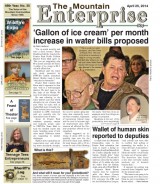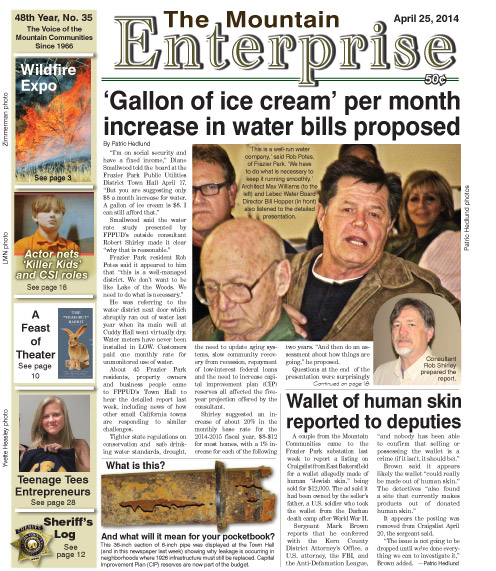By Patric Hedlund
“I’m on social security and have a fixed income,” Diane Smallwood told the board at the Frazier Park Public Utilities District Town Hall April 17. “But you are suggesting only $8 a month increase for water. A gallon of ice cream is $8. I can still afford that.”
Smallwood said the water rate study presented by FPPUD’s outside consultant Robert Shirley made it clear “why that is reasonable.”
Frazier Park resident Rob Potes said it appeared to him that “this is a well-managed district. We don’t want to be like Lake of the Woods. We need to do what is necessary.”
He was referring to the water district next door which abruptly ran out of water last year when its main well at Cuddy Hall went virtually dry. Water meters have never been installed in LOW. Customers paid one monthly rate for unmonitored use of water.
About 45 Frazier Park residents, property owners and business people came to FPPUD’s Town Hall to hear the detailed report last week, including news of how other small California towns are responding to similar challenges.
Tighter state regulations on conservation and safe drinking water standards, drought, the need to update aging systems, slow community recovery from recession, repayment of low-interest federal loans and the need to increase capital improvement plan (CIP) reserves all affected the five-year projection offered by the consultant.
Shirley suggested an increase of about 20% in the monthly base rate for the 2014-2015 fiscal year, $8-$12 for most homes, with a 1% increase for each of the following two years. “And then do an assessment about how things are going,” he proposed.
Questions at the end of the presentation were surprisingly positive. FPPUD Directors were concerned about those on fixed incomes, said Director Jerry Garcia. “This is a conservative approach,” Rob Shirley replied, underscoring that the proposal holds rates to a mild 1% increase after the initial base rate adjustment, with a plan to review in 2017 whether increases are meeting expenses.
A tiered consumption rate will also be implemented to encourage conservation. Those who use more water will pay a higher price above their first 1,000 gallons each month.
Charts handed to the attendees showed the impact of the 2008 financial crisis on the district [see chart at right] with loss of customers due to foreclosures and the construction freeze.
The board also reported that USDA accountants who helped set the last rate increase in 2009 did not take into account the number of empty vacation homes in this area, which also undercuts revenues.
The district was receiving about $86,000 a year in new connection fees in 2007 during the real estate boom. That dropped $20,000 each year until 2012 when zero revenue was received for new connections, Shirley said.
The annual operating expense for the district is now about $880,000 with $720,000 in revenue, Shirley’s report said. In 2012 the audit showed an operating loss of $176,000 for the year (the 2013 audit is not yet complete). The district has economized by eliminating the general manager position, splitting duties between the office manager and the field operations manager. Staff days were reduced to four rather than five. But debt service on system improvement loans is also coming due.
Letters to FPPUD customers will be put in the mail on Friday, April 25 informing them of a public hearing to be held June 21. Written protests must be submitted before the end of that meeting. It will take protests from 51% of all customers to overturn the proposed changes, according to the law, Shirley said.
Photo Captions:
Consultant Rob Shirley prepared the report.
What is this? And what will it mean for your pocketbook?
This 36-inch section of 6-inch pipe was displayed at the Town Hall (and in this newspaper last week) showing why leakage is occurring in neighborhoods where 1926 infrastructure must still be replaced. Capital Improvement Plan (CIP) reserves are now part of the budget.
To see full stories with photos, please go to The Mountain Enterprise e-Edition
(login required)
Have your newspaper delivered via mail and include internet access! Just call 661-245-3794.
Or step out and get it right now! This story and others are available right now at newsstands throughout the Mountain Communities in The Mountain Enterprise.
This is part of the April 25, 2014 online edition of The Mountain Enterprise.
Have an opinion on this matter? We'd like to hear from you.

![‘This is a well-run water company,’ said Rob Potes, of Frazier Park. ‘We have to do what is necessary to keep it running smoothly.’ Architect Max Williams (to the left) and Lebec Water Board Director Bill Hopper (in front) also listened to the detailed presentation. [photo by Patric Hedlund]](https://mountainenterprise.com/wp-content/uploads/RobPotes-Excellent_web-324x243.jpg)

